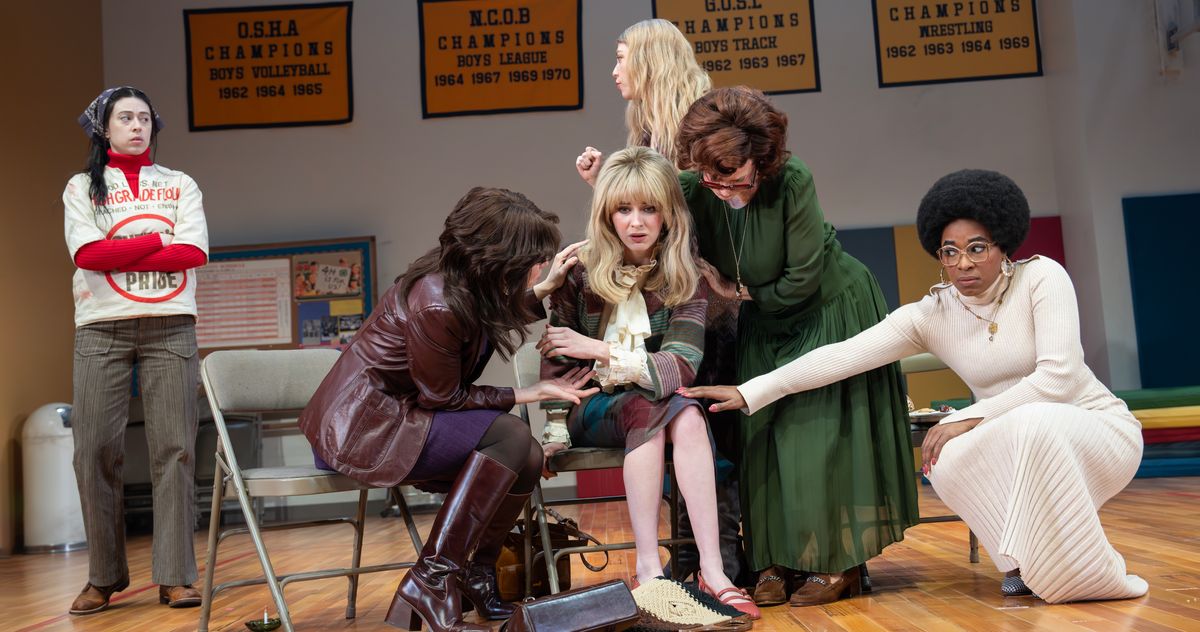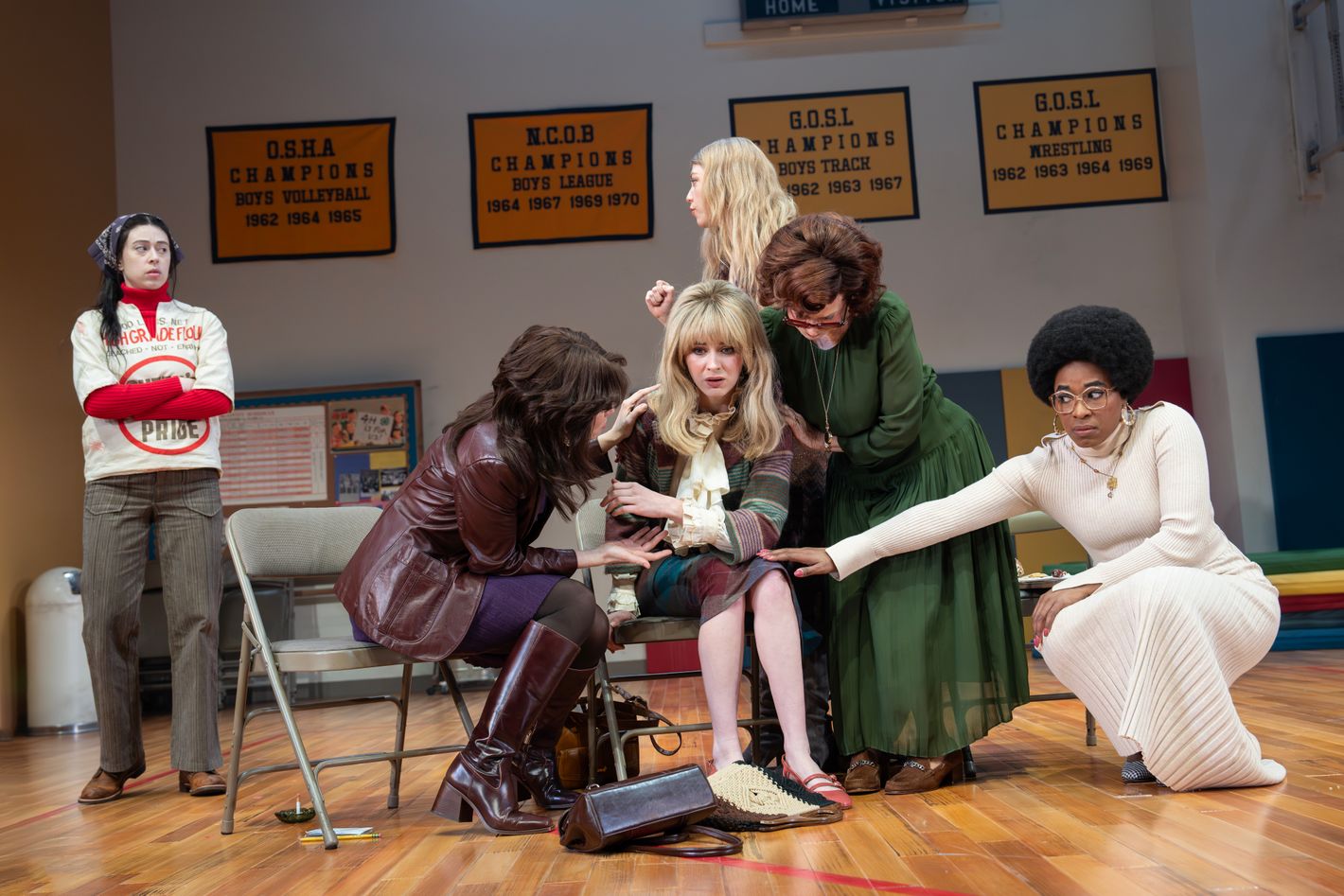Liberation Is the Best Play I’ve Seen This Season
Bess Wohl’s latest is drawn from the true stories of her mother’s 1970s encounter group.


Why aren’t we all talking more about Bess Wohl? I remember wondering as much almost six years ago, when her incisive climate-crisis tragicomedy Continuity crept with deceptively light footsteps into my consciousness and quietly refused to leave. Now, I’m still regaining my breath in the wake of Liberation, Wohl’s newest play, which balances the intensely personal and the broadly civic, the ethical and the theatrical, with extraordinary rigor and grace. Wohl should be a part of the conversation when we talk about Annie Baker or Jackie Sibblies Drury, writers at the top of their craft who are similarly preoccupied with how the permeable, malleable dramatic form can crack open painfully tender questions of how we treat each other, at both the micro and macro ends of the spectrum.
What I haven’t yet seen either of those writers do — and this is no knock, simply an acknowledgment that Wohl is venturing somewhere vulnerable and new — is explicitly insert their own presence, their own avatar, into a play. It’s a chancy move. When Susannah Flood enters the stage at the top of Liberation, house lights still up, and begins to address the audience casually (“Hi. Hi. Is everyone — is everyone good? Comfortable? … How long is this going to take, right? I know that’s all anyone really wants to know: the running time”), there’s ease and humor to the gesture, and there’s also risk. Could this whole thing become a diary reading? Will Flood, as the playwright figure, prove a conduit or a dam, a source of flexibility or sticky, sentimental constriction? How will she — or rather, through her, Wohl — navigate the steps of a long theatrical tradition, the memory play? “I am here with you, in the present. Hi,” Flood says, with just a hint of sheepishness. “And I want to bring back some things that happened in the past. People, too. I — I — think we all know how this kind of thing works.”
Whether or not we do, Wohl takes an old form and shakes it like a freshly laundered sheet in the breeze. The buzzing fluorescents of an old rec-center basketball court replace Tom Wingfield’s dim lighting; sentimentality is brushed aside in a rush of urgent, impassioned conversation; realism — if we take that loaded term to mean the closed-off, mimetic representation of people being people — comes and goes as necessary, and Flood’s character isn’t the only one onstage empowered to step outside of it. Liberation, says Wohl’s subtitle, is “A Memory Play About Things I Don’t Remember,” and from the very beginning, her stage is set for simultaneity and translucency, layers of time and circumstance shifting across and appearing through one another. Flood’s own body contains the inciting duality: She is both the play’s narrator, and thus a stand-in for Wohl, and a character named Lizzie, who is Wohl’s late mother. “The year was 1970,” Flood’s narrator-self tells us before she drops into her second role. “And my mom. My devoted, dutiful mom who sewed the costumes for every school play and cooked every family dinner … and took me to every piano lesson … she was actually … a radical?”
Lizzie has arrived in the basement of this Ohio rec center having done what every fervent organizer has done at least since the Xerox machine appeared and probably long before: She’s put up a flyer. Her goal is to start a women’s consciousness-raising group, and her efforts have brought together a motley, inquisitive quintet. Isidora (Irene Sofia Lucio) is Sicilian, apt to talk over people (“I’m Italian, that’s what we do”) and serving her time in a green-card marriage. Susan (Adina Verson) lives in her car, writes radical Marxist tracts on napkins, and is “burnt the fuck out” on women’s lib: “Like, I don’t even know what to say anymore,” she growls, leveling a stinging dart from more than half a century ago. “Women are human beings. If you don’t believe that, at this point, I don’t know how I can help you.” Blonde and prim, Dora (Audrey Corsa) — “I’m Dora!” she blurts out with a self-deprecating giggle when Italian Dora introduces herself — thought this was the rec center’s weekly knitting circle, but her interest is sufficiently piqued to stick around. Margie (Betsy Aidem) has an empty nest and a retired husband whom she’s trying to avoid stabbing (“I realize that sounds like a joke. It’s not a joke,” she says in a tone as flat and dry as Death Valley), and Celeste (Kristolyn Lloyd), the only Black woman to have responded to Lizzie’s flyer, is straight-backed and intimidatingly classy. Her clothes are precisely chosen, her words even more so, and she holds space with the formidable poise of a warrior expertly skilled in not letting onlookers see the fight.
“So. These are the women,” narrator-slash-Lizzie tells us before the action begins. The characters haven’t yet opened their mouths, but the firepower of this group of actors is already palpable. They enter the stage charged up and ready and, under Whitney White’s assured direction, proceed to summon and surf a growing wave of charisma, camaraderie, tenderness, and tension — all dynamos and all generous, from Verson’s scrappy, surly, covertly sensitive Susan to Lloyd’s exacting, self-contained, deep-feeling Celeste, a volcano of a woman exerting immense energy to keep from erupting in a way that she can’t control. Celeste, like all these characters, is a creation of Wohl’s but based very much on a real woman who joined her mother’s CR group. Influenced by a previous collaboration with Steve Cosson and the Civilians, Wohl took a documentary-theater approach to researching for Liberation, interviewing everyone from that group that she could. With subtle shifts in Cha See’s lighting, the play jumps through time: In one moment, Flood is Lizzie, passionately debating with her friends — in the next, she’s the narrator, suddenly unmoored and childlike, seeking wisdom from Dora or Isidora, both of whom intermittently become their older selves. There’s a hilarious moment in which Isidora, having lost none of her intensity with age, suggests that the narrator watch Fellini’s City of Women and read Oleanna. “Do you mean the David Mamet play?” Flood asks with blinking incredulity as Isidora blazes on to something else. Hey, feminists contain multitudes.
The gauziness of time’s veil in Liberation is part of what makes a play that could easily have been a straightforward period piece so vital and affecting. We’re never not in the rec center; we’re also never not on this stage, or inside Wohl’s process of creation, as she tries to piece together why the things that her mother’s generation “unquestionably did” now feel like they’re “all slipping away.” Meanwhile, the craft of distilling fiction from life is being actively interrogated: “I’m not sure what I’m even doing here, to be honest,” Lloyd’s Celeste says to the narrator at one point. She’s speaking from somewhere outside time — the real-life woman behind Celeste died of cancer in her 60s and thus couldn’t be interviewed — so the narrator is left to read the book she left behind, to imagine, and to risk the construction of a character she can never fully know. “Like, what is my presence doing here, in this story?” Lloyd goes on, fixing a hard gaze on Flood. “I struggle with that, I do.”
Serious questions of authorship — of who can write what roles, who can tell what stories — not only echo in the bodies of Wohl’s characters but find voice through them. In the end, it is they who help the author to calm those anxieties, which are ultimately more egocentric than useful. In one remarkable sequence, a character named Joanne (Kayla Davion) — whom we’ve only seen pop into the gym to search for her son’s lost backpack — enters the stage to volunteer to sub in for Lizzie. A handsome, basketball-playing lawyer named Bill (Charlie Thurston) has appeared on the scene, and the narrator can’t actually bring herself to play a crucial scene with him because “it’s so strange … This is my dad.” Joanne is Black and emphatically not a part of the CR group — she and Celeste eventually share a scene in which their divergent perspectives spark painful heat — but she’s also feeling some kind of way about how small her part has been. “I mean, I haven’t really done much so far,” she quips at the narrator. “Like, I just came in looking for a backpack for a hot second … I’m being underutilized.” Davion gets comedy out of all of this, and, at the same time, she neither lets the narrator (or the audience) forget who’s at the story’s center nor lets her wallow in self-recrimination. When Flood begins to get twitchy and apologetic — “I know that the movement didn’t do enough to include everyone … And I’m sorry. I can’t, like, tackle everything — I think I’m doing probably a very bad job …” — Davion’s Joanne shuts it down. “You’re actually fine,” she says, not unkind but certainly not indulgent. “You’re fine.” Later on, in another act of compassionate substitution, Aidem’s Margie steps in to represent older Lizzie, because Wohl lost her own mother before ever asking her about these moments in her life. Flood and Aidem produce something absolutely gorgeous together, a heartbreaking mini-miracle of theater as séance, and I’m honestly still recovering from it.
It takes courage to attempt a play like Liberation — the courage of sincerity and imperfection. In our age of self-kneecapping carefulness, Wohl both takes risks and dramatizes the moral dilemma of taking them. I stuck around for a talkback after the show, and someone asked about the absence of overtly queer or trans perspectives in the play. Queerness actually abounds, in both subtle and significantly manifest ways, and I’d argue that Susan’s relationship with gender might well be playing out in very different terms were she a product of a different time — but none of that is the point. The point is that stories like Wohl’s are going to find themselves haunted by progressive paralysis, by the pressure to “tackle everything.” The perpetual challenge, as Isidora, a filmmaker stuck in the role of production assistant, knows, is not to play it safe. “We didn’t go far enough,” her older self tells the narrator. “We were all so middle-of-the-road, the middle of the road is the death of everything. It’s the death of art.” I think she’s selling the group short, but still, Wohl, White, and their marvelous actors heed the great truth of her warning. Liberation goes all the way, and in doing so, exhorts us all to keep going.
Liberation is at the Laura Pels Theatre at Roundabout through March 30.
Related








